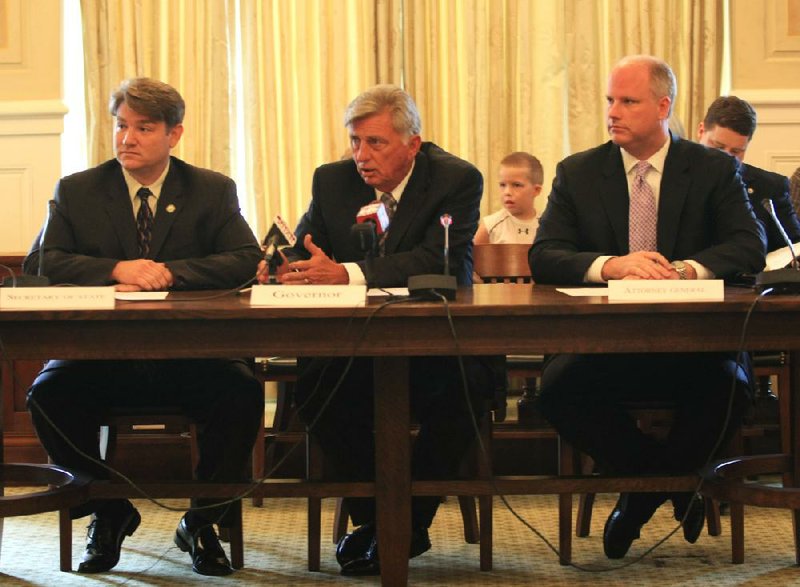HELENA-WEST HELENA — Gov. Mike Beebe testified in federal court Tuesday that he wanted to keep the black voting-age population high in an east Arkansas Senate district, but that he and the redistricting panel he chaired had to consider all of the state’s legislative districts.
Taking the witness stand for the first time since he was sworn-in in 2007, Beebe defended the plan approved by the Board of Apportionment last year against claims that it intentionally discriminated against blacks in east Arkansas. Sen. Jack Crumbly and a handful of eastern Arkansas voters say the maps dilute black voting strength in Senate District 24. They have asked a three-judge panel to order the district redrawn.
“You just want to think about one district. We didn’t have that luxury,” Beebe testified under questioning by Crumbly’s lawyer, James Valley.
The governor denied accusations that the board wanted to help Rep. Keith Ingram, who has mounted a primary challenge to Crumbly in the district surrounding West Memphis. Beebe also said that, at the time the borders were drawn, he didn’t know Ingram was going to run.
Ingram testified later Tuesday that he didn’t consider running for the Senate seat until after redistricting and had originally planned to run again for his state House seat. Crumbly is black, Ingram is white.
“The last thing on my mind was for Sen. Crumbly to be beaten,” said Beebe, who called Crumbly a political ally.
Early voting opened Monday for the May 22 primary. There is no Republican in the race.
The governor testified for about two hours Tuesday. During his testimony, he was cross-examined by a former political rival, ex-prosecutor and ex-congressman Asa Hutchinson, who is representing Secretary of State Mark Martin. Beebe defeated Hutchinson in the 2006 governor’s race.
Asked about Martin’s proposals, Beebe acknowledged that the Democrats on the panel generally ignored the Republican.
“In all fairness and in all candor, most of his suggestions were discarded,” Beebe said.
Martin voted against the approved maps and said his plan would have boosted the black voting-age population in Crumbly’s district to 56 percent.
The maps for Arkansas’ 100 House and 35 Senate seats are drawn by the governor, attorney general and secretary of state, who make up the Board of Apportionment. Beebe and Attorney General Dustin McDaniel, both Democrats, approved the new maps.
Martin complained in testimony Monday that Beebe and McDaniel ignored his suggestions. Beebe, however, said Tuesday that Martin set the tone by hiring a coordinator and spending money from the board’s redistricting budget without a vote from the entire board. Martin later charged the expenditures to his own budget.
Beebe called Martin’s action’s “irritating.”
A panel of three federal judges — Leon Holmes, Lavenski Smith and Susan Webber Wright — planned to hear up to a week of testimony in the case.
Crumbly, who was expected to testify later Tuesday, had complained to Beebe about the changes in a heated meeting between the governor and black lawmakers, state Sen. Joyce Elliott said Tuesday. Elliott said she didn’t remember specifically what was said to Crumbly but that the meeting “ended in a very disrespectful and summarily dismissive way of Sen. Crumbly’s position.”
Beebe said that Crumbly’s other proposals would have adversely affected a different majority black Senate district and stretched another district too far west. Beebe said he didn’t have a problem with a map the plaintiffs have proposed that would create a district with 58 percent black voting-age percentage, but noted this map wasn’t brought up during the redistricting discussion.
Beebe said he didn’t have a specific percentage in mind for the district.
Ingram was asked about flyers from his campaign that appeared to target two different sets of voters — one primarily featuring white supporters, the other featuring black supporters. Ingram said he didn’t know which neighborhoods were targeted with the mailers.
